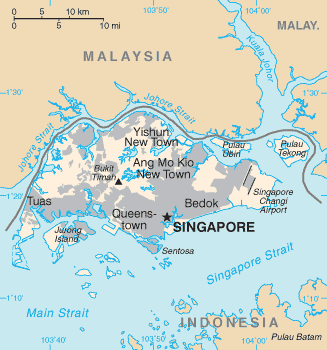I must admit that I know very little about Singapore’s late long-serving Prime Minister, or that he’d been quite outspoken in his views on Islam and how Muslims must fit in to Singapore’s future (and not the other way around):
Singapore has been in the news for other reasons recently, but its appearance on the world stage, however brief, may provide us with an excuse to consider the views on Islam of the founding father of Singapore, and its longest-serving Prime Minister, Lee Kuan Yew, who died in 2015. Lee Kuan Yew lived in a multicultural city, with a Chinese majority and Indian and Muslim Malay minorities. All his political life, Lee Kuan Yew was aware of the need to keep the Muslim population in check. The laws he had passed, the regulations he enforced, were directed in large part to that end. He knew about Muslim efforts to convert others, and he made sure that any convert had to immediately register with the government, so such efforts could be monitored, and then countered, by the government. A study of all the ways that Lee Kuan Yew dealt with Muslims, and took careful note of, and combated, their natural aggressiveness and political machinations in tiny Singapore, an island of mostly Unbelievers — 3/4 of whom are Chinese — in a Muslim sea, should be instructive for Western leaders, who have the same problem and as yet only timid and confused ideas as to how to solve it.
Wikileaks revealed that Lee Kuan Yew had called Islam “a venomous religion.” He made sure to limit the numbers of Muslims in Singapore’s armed forces, suggesting their religion made them a possible danger to their non-Muslim fellow soldiers. In his “The Malays in Singapore,” he wrote that “if, for instance, you put in a Malay officer who’s very religious and who has family ties in Malaysia in charge of a machine gun unit, that’s a very tricky business.” It was under his leadership that the government instituted a ban on hijabs and other Muslim headscarves in both the police forces and nursing jobs. Lee Kuan Yew also substantially reduced government funding for madrasas, while increasing support for secular education. His government carefully monitored the mosques, both for the content of the imam’s sermons, and for any foreign (especially Saudi) sources of financial support that might lead to a mosque being “radicalized.” Clearly he understood the danger of Islam.
Lee Kuan Yew had, after all, originally declared Singapore’s independence from Malaysia because the Muslim Malays rejected meritocracy, and insisted on giving economic advantage to themselves. All Malays were required to be counted as Muslims (even if some were not), and all Muslims benefited from a disguised jizyah tax on non-Muslims which is called the “Bumiputra.” Although the word means “sons of the soil,” it is not the indigenous Malaysian tribes that benefit from the “Bumiputra” policy, but Malay Muslims alone.
Singapore has been an economic miracle since independence, but it has been ruled with an authoritarian iron hand in many ways.




